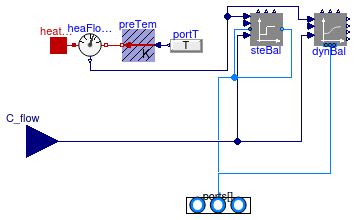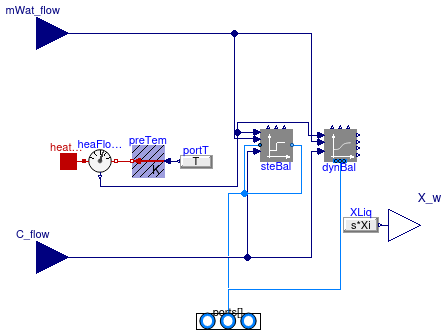Buildings.Fluid.MixingVolumes
Package with mixing volumes
Information
This package contains models for completely mixed volumes.
For most situations, the model Buildings.Fluid.MixingVolumes.MixingVolume should be used. The other models are only of interest if water should be added to or subtracted from the fluid volume, such as in a coil with water vapor condensation.
Extends from Modelica.Icons.VariantsPackage (Icon for package containing variants).
Package Content
| Name | Description |
|---|---|
| Mixing volume with inlet and outlet ports (flow reversal is allowed) | |
| Mixing volume with heat port for latent heat exchange, to be used if moisture is added or removed | |
| Collection of models that illustrate model use and test models | |
| Collection of validation models | |
| Package with base classes for Buildings.Fluid.MixingVolumes |
 Buildings.Fluid.MixingVolumes.MixingVolume
Buildings.Fluid.MixingVolumes.MixingVolume
Mixing volume with inlet and outlet ports (flow reversal is allowed)

Information
This model represents an instantaneously mixed volume.
Potential and kinetic energy at the port are neglected,
and there is no pressure drop at the ports.
The volume can exchange heat through its heatPort.
The volume can be parameterized as a steady-state model or as dynamic model.
To increase the numerical robustness of the model, the constant
prescribedHeatFlowRate can be set by the user.
This constant only has an effect if the model has exactly two fluid ports connected,
and if it is used as a steady-state model.
Use the following settings:
- Set
prescribedHeatFlowRate=trueif the only means of heat transfer at theheatPortis a prescribed heat flow rate that is not a function of the temperature difference between the medium and an ambient temperature. Examples include an ideal electrical heater, a pump that rejects heat into the fluid stream, or a chiller that removes heat based on a performance curve. If theheatPortis not connected, then setprescribedHeatFlowRate=trueas in this case,heatPort.Q_flow=0. - Set
prescribedHeatFlowRate=falseif there is heat flow at theheatPortcomputed as K * (T-heatPort.T), for some temperature T and some conductance K, which may itself be a function of temperature or mass flow rate.
If there is a combination of K * (T-heatPort.T) and a prescribed heat flow rate, for example a solar collector that dissipates heat to the ambient and receives heat from the solar radiation, then setprescribedHeatFlowRate=false.
Options
The parameter mSenFac can be used to increase the thermal mass of this model
without increasing its volume. This way, species concentrations are still calculated
correctly even though the thermal mass increases. The additional thermal mass is calculated
based on the density and the value of the function HeatCapacityCp
of the medium state state_default.
This parameter can for instance be useful in a pipe model when the developer wants to
lump the pipe thermal mass to the fluid volume. By default mSenFac = 1, hence
the mass is unchanged. For higher values of mSenFac, the mass will be scaled proportionally.
Set the parameter use_C_flow = true to enable an input connector for the trace substance flow rate.
This allows to directly add or subtract trace substances such as
CO2 to the volume.
See
Buildings.Fluid.Sensors.Examples.PPM
for an example.
Implementation
If the model is operated in steady-state and has two fluid ports connected,
then the same energy and mass balance implementation is used as in
steady-state component models, i.e., the use of actualStream
is not used for the properties at the port.
The implementation of these balance equations is done in the instances
dynBal for the dynamic balance and steBal
for the steady-state balance. Both models use the same input variables:
-
The variable
Q_flowis used to add sensible and latent heat to the fluid. For example,Q_flowparticipates in the steady-state energy balanceport_b.h_outflow = inStream(port_a.h_outflow) + Q_flow * m_flowInv;wherem_flowInvapproximates the expression1/m_flow. -
The variable
mXi_flowis used to add a species mass flow rate to the fluid.
For the rationale of selecting different energy and mass balances, and for the
use of prescribedHeatFlowRate, see the documentation of
Buildings.Fluid.MixingVolumes.BaseClasses.PartialMixingVolume.
For simple models that uses this model, see Buildings.Fluid.HeatExchangers.HeaterCooler_u and Buildings.Fluid.Humidifiers.Humidifier_u.
Extends from Buildings.Fluid.MixingVolumes.BaseClasses.PartialMixingVolume (Partial mixing volume with inlet and outlet ports (flow reversal is allowed)).
Parameters
| Type | Name | Default | Description |
|---|---|---|---|
| replaceable package Medium | PartialMedium | Medium in the component | |
| Volume | V | Volume [m3] | |
| Nominal condition | |||
| MassFlowRate | m_flow_nominal | Nominal mass flow rate [kg/s] | |
| Dynamics | |||
| Equations | |||
| Dynamics | energyDynamics | Modelica.Fluid.Types.Dynamic... | Type of energy balance: dynamic (3 initialization options) or steady state |
| Dynamics | massDynamics | energyDynamics | Type of mass balance: dynamic (3 initialization options) or steady state |
| Real | mSenFac | 1 | Factor for scaling the sensible thermal mass of the volume |
| Initialization | |||
| AbsolutePressure | p_start | Medium.p_default | Start value of pressure [Pa] |
| Temperature | T_start | Medium.T_default | Start value of temperature [K] |
| MassFraction | X_start[Medium.nX] | Medium.X_default | Start value of mass fractions m_i/m [kg/kg] |
| ExtraProperty | C_start[Medium.nC] | fill(0, Medium.nC) | Start value of trace substances |
| ExtraProperty | C_nominal[Medium.nC] | fill(1E-2, Medium.nC) | Nominal value of trace substances. (Set to typical order of magnitude.) |
| Advanced | |||
| Boolean | initialize_p | not Medium.singleState | = true to set up initial equations for pressure |
| MassFlowRate | m_flow_small | 1E-4*abs(m_flow_nominal) | Small mass flow rate for regularization of zero flow [kg/s] |
| Boolean | use_C_flow | false | Set to true to enable input connector for trace substance |
| Assumptions | |||
| Boolean | allowFlowReversal | true | = false to simplify equations, assuming, but not enforcing, no flow reversal. Used only if model has two ports. |
Connectors
| Type | Name | Description |
|---|---|---|
| VesselFluidPorts_b | ports[nPorts] | Fluid inlets and outlets |
| output RealOutput | U | Internal energy of the component [J] |
| output RealOutput | m | Mass of the component [kg] |
| output RealOutput | mXi[Medium.nXi] | Species mass of the component [kg] |
| output RealOutput | mC[Medium.nC] | Trace substance mass of the component [kg] |
| HeatPort_a | heatPort | Heat port for heat exchange with the control volume |
| input RealInput | C_flow[Medium.nC] | Trace substance mass flow rate added to the medium |
Modelica definition
 Buildings.Fluid.MixingVolumes.MixingVolumeMoistAir
Buildings.Fluid.MixingVolumes.MixingVolumeMoistAir
Mixing volume with heat port for latent heat exchange, to be used if moisture is added or removed

Information
Model for an ideally mixed fluid volume and the ability to store mass and energy. The volume is fixed, and latent and sensible heat can be exchanged.
This model represents the same physics as
Buildings.Fluid.MixingVolumes.MixingVolume, but in addition, it allows
adding or subtracting water to the control volume.
The mass flow rate of the added or subtracted water is
specified at the port mWat_flow.
Adding mWat_flow itself does not affect the energy balance
in this model. Hence, the enthalpy that is added or removed with the
flow of mWat_flow needs to be added to the heat port
heatPort.
To increase the numerical robustness of the model, the constant
prescribedHeatFlowRate can be set by the user.
This constant only has an effect if the model has exactly two fluid ports connected,
and if it is used as a steady-state model.
Use the following settings:
- Set
prescribedHeatFlowRate=trueif the only means of heat transfer at theheatPortis a prescribed heat flow rate that is not a function of the temperature difference between the medium and an ambient temperature. Examples include an ideal electrical heater, a pump that rejects heat into the fluid stream, or a chiller that removes heat based on a performance curve. If theheatPortis not connected, then setprescribedHeatFlowRate=trueas in this case,heatPort.Q_flow=0. - Set
prescribedHeatFlowRate=falseif there is heat flow at theheatPortcomputed as K * (T-heatPort.T), for some temperature T and some conductance K, which may itself be a function of temperature or mass flow rate.
If there is a combination of K * (T-heatPort.T) and a prescribed heat flow rate, for example a solar collector that dissipates heat to the ambient and receives heat from the solar radiation, then setprescribedHeatFlowRate=false.
Options
The parameter mSenFac can be used to increase the thermal mass of this model
without increasing its volume. This way, species concentrations are still calculated
correctly even though the thermal mass increases. The additional thermal mass is calculated
based on the density and the value of the function HeatCapacityCp
of the medium state state_default.
This parameter can for instance be useful in a pipe model when the developer wants to
lump the pipe thermal mass to the fluid volume. By default mSenFac = 1, hence
the mass is unchanged. For higher values of mSenFac, the mass will be scaled proportionally.
Set the parameter use_C_flow = true to enable an input connector for the trace substance flow rate.
This allows to directly add or subtract trace substances such as
CO2 to the volume.
See
Buildings.Fluid.Sensors.Examples.PPM
for an example.
Extends from Buildings.Fluid.MixingVolumes.BaseClasses.PartialMixingVolume (Partial mixing volume with inlet and outlet ports (flow reversal is allowed)).
Parameters
| Type | Name | Default | Description |
|---|---|---|---|
| replaceable package Medium | PartialMedium | Medium in the component | |
| Volume | V | Volume [m3] | |
| Nominal condition | |||
| MassFlowRate | m_flow_nominal | Nominal mass flow rate [kg/s] | |
| Dynamics | |||
| Equations | |||
| Dynamics | energyDynamics | Modelica.Fluid.Types.Dynamic... | Type of energy balance: dynamic (3 initialization options) or steady state |
| Dynamics | massDynamics | energyDynamics | Type of mass balance: dynamic (3 initialization options) or steady state |
| Real | mSenFac | 1 | Factor for scaling the sensible thermal mass of the volume |
| Initialization | |||
| AbsolutePressure | p_start | Medium.p_default | Start value of pressure [Pa] |
| Temperature | T_start | Medium.T_default | Start value of temperature [K] |
| MassFraction | X_start[Medium.nX] | Medium.X_default | Start value of mass fractions m_i/m [kg/kg] |
| ExtraProperty | C_start[Medium.nC] | fill(0, Medium.nC) | Start value of trace substances |
| ExtraProperty | C_nominal[Medium.nC] | fill(1E-2, Medium.nC) | Nominal value of trace substances. (Set to typical order of magnitude.) |
| Advanced | |||
| Boolean | initialize_p | not Medium.singleState | = true to set up initial equations for pressure |
| MassFlowRate | m_flow_small | 1E-4*abs(m_flow_nominal) | Small mass flow rate for regularization of zero flow [kg/s] |
| Boolean | use_C_flow | false | Set to true to enable input connector for trace substance |
| Assumptions | |||
| Boolean | allowFlowReversal | true | = false to simplify equations, assuming, but not enforcing, no flow reversal. Used only if model has two ports. |
Connectors
| Type | Name | Description |
|---|---|---|
| VesselFluidPorts_b | ports[nPorts] | Fluid inlets and outlets |
| output RealOutput | U | Internal energy of the component [J] |
| output RealOutput | m | Mass of the component [kg] |
| output RealOutput | mXi[Medium.nXi] | Species mass of the component [kg] |
| output RealOutput | mC[Medium.nC] | Trace substance mass of the component [kg] |
| input RealInput | mWat_flow | Water flow rate added into the medium [kg/s] |
| output RealOutput | X_w | Species composition of medium [kg/kg] |
| HeatPort_a | heatPort | Heat port for sensible plus latent heat exchange with the control volume |
| input RealInput | C_flow[Medium.nC] | Trace substance mass flow rate added to the medium |
